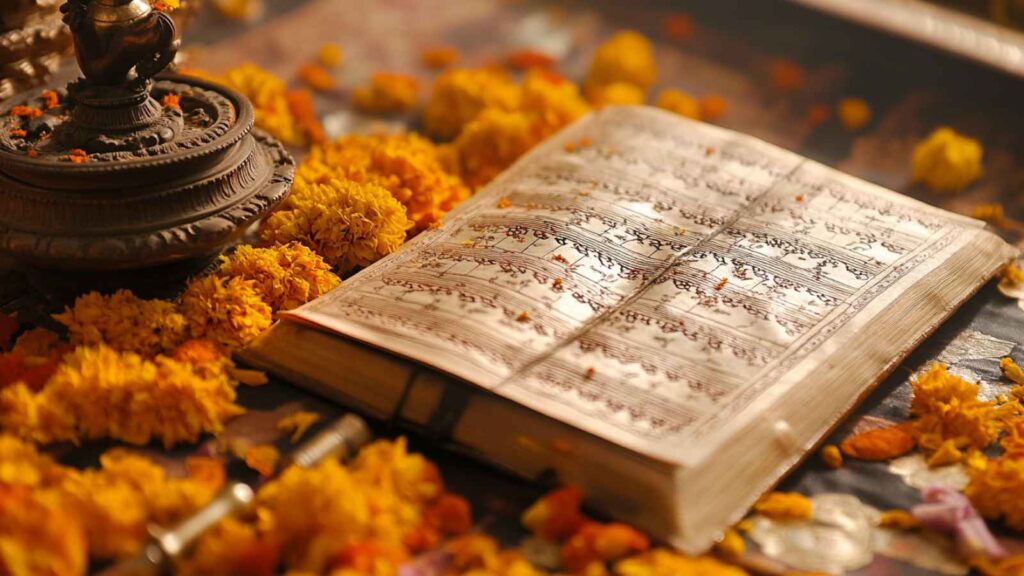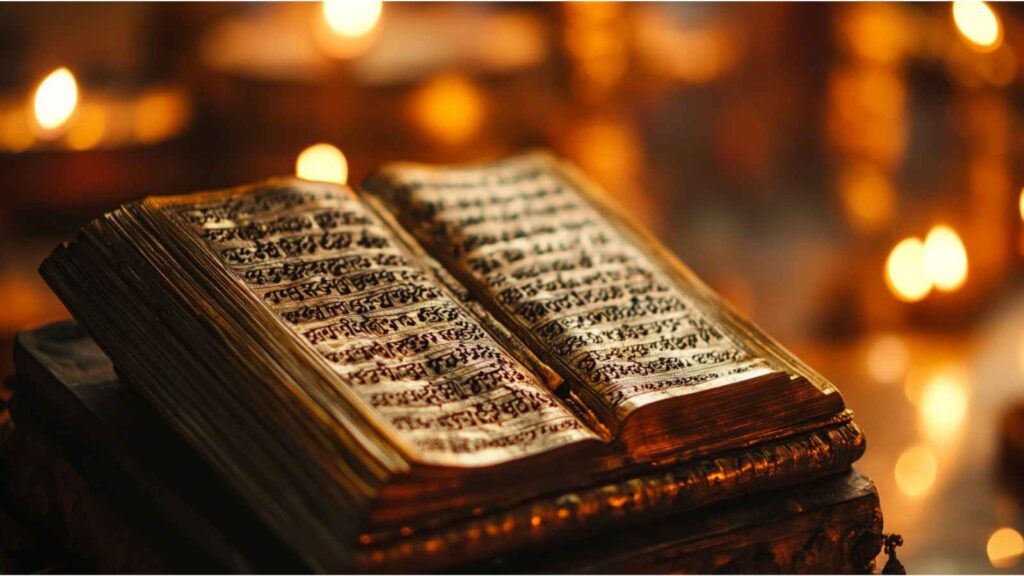Understanding Rigveda: Key Hymns and Their Significance in Modern Hinduism
Introduction
The Rigveda, one of the four Vedas of Hinduism, holds a place of unparalleled importance in the world’s spiritual and literary traditions. Composed over 3,000 years ago, the Rigveda is a collection of hymns (suktas) dedicated to various deities, exploring themes of cosmology, nature, and human existence. While these texts emerged in an ancient and vastly different cultural context, their impact on modern Hinduism remains profound. The hymns of the Rigveda continue to inspire millions, providing spiritual and philosophical guidance that resonates even in contemporary times.
Read More About sacred texts
In this article, we will delve into the key hymns of the Rigveda, exploring their historical context, core teachings, and ongoing relevance in modern Hinduism. We will discuss the hymns’ roles in rituals, their influence on Hindu philosophy, and their impact on the way Hindus approach spirituality today.
What is the Rigveda?

The Rigveda is the oldest of the four Vedas and the foundation of Vedic literature. It is composed of over 1,000 hymns (known as suktas) arranged into ten books, or mandalas, each dedicated to different deities. These hymns were originally passed down orally, and their purpose was to invoke the divine, offer praise, and request blessings from the gods. The Rigveda serves as a source of deep philosophical insight and reflects the spiritual worldview of early Indo-Aryan society.
The text is filled with prayers and hymns to gods like Indra, Agni, Varuna, and Soma, and is a primary source for understanding Vedic rituals, cosmology, and human life. It offers insights into the early development of Hindu thought and practices, many of which remain integral to modern Hinduism.
Key Hymns of the Rigveda and Their Significance

The Rigveda’s hymns are considered both sacred and poetic. They explore not only the external universe and the divine but also the internal spiritual journey of the individual. Some hymns stand out due to their profound philosophical depth, and many of them have played a crucial role in shaping Hindu religious practices and beliefs.
1. The Nasadiya Sukta (Creation Hymn) – Rigveda 10.129
The Nasadiya Sukta is one of the most famous hymns in the Rigveda, addressing the creation of the universe. It expresses a sense of wonder and uncertainty about the origins of the cosmos. The hymn is often cited as one of the earliest philosophical reflections on creation, as it questions the very nature of existence, saying:
“Who really knows? Who can declare it here? Whence was it born? Whence came this creation?”
This hymn reflects the Vedic perspective that creation is a mystery and is deeply tied to the concept of Brahman (the ultimate reality). It lays the groundwork for later Hindu philosophical discussions about the nature of the universe, the divine, and the self. In modern Hinduism, this hymn is often referenced in discussions of the incomprehensibility of the divine and the nature of existence.
2. The Gayatri Mantra – Rigveda 3.62.10
One of the most revered and widely chanted hymns in Hinduism, the Gayatri Mantra is a prayer for spiritual enlightenment and understanding. It is addressed to the Sun god, Savitar, invoking his divine light to illuminate the mind and lead the devotee towards wisdom. The Gayatri mantra is:
“Om bhur bhuvah svah
Tat savitur varenyam
Bhargo devasya dhimahi
Dhiyo yo nah prachodayat”
The significance of this mantra is profound. It represents the light of consciousness and divine guidance. Chanting the Gayatri Mantra is a central practice in Hinduism, and it is believed to purify the mind and soul. It is also considered a universal prayer, transcending sectarian divides, and is widely used by Hindus of all traditions.
3. The Agni Sukta (Hymn to Agni) – Rigveda 1.1
The Agni Sukta is a hymn dedicated to Agni, the Vedic god of fire, who is seen as the intermediary between humans and the gods. Agni is central to Vedic rituals, and this hymn praises his powers, seeking his blessings for prosperity, peace, and spiritual progress. The hymn begins with the famous invocation:
“Agni, I praise you, the chief priest of the sacrifice, the most divine one, the god of the fire.”
Agni is considered the purifier and the messenger who carries offerings to the gods. This hymn underscores the ritualistic nature of Vedic worship, where fire rituals were paramount. In modern Hinduism, Agni continues to play a key role in sacred rituals such as Homa and Yajna, and this hymn is recited during fire rituals to invoke Agni’s blessings.
4. The Purusha Sukta (The Hymn to Purusha) – Rigveda 10.90
The Purusha Sukta is one of the most important hymns in the Rigveda and addresses the cosmic sacrifice of Purusha, the primal man or cosmic being. According to this hymn, the universe and all its creatures emerged from the sacrifice of Purusha. The hymn outlines the creation of the world, the social order, and the connection between all living beings. The hymn begins:
“The Purusha is all that has been and all that is to be. He is the lord of immortality, and through him, all creation lives.”
The Purusha Sukta is significant in explaining the Varna system in Hinduism, as it depicts the origin of the four varnas (social classes) from Purusha’s body: the Brahmins from his mouth, the Kshatriyas from his arms, the Vaishyas from his thighs, and the Shudras from his feet. In modern Hinduism, this hymn is often interpreted in both spiritual and social contexts, symbolizing the interconnectedness of all beings and the divine order of the universe.
5. The Soma Sukta (Hymn to Soma) – Rigveda 9.113
The Soma Sukta is a hymn dedicated to Soma, the divine drink that was believed to have the power to bring immortality. Soma was also associated with the moon and was an important deity in Vedic rituals. The hymn extols Soma’s divine attributes and its role in the sacrificial rites. One of the lines from the hymn is:
“Soma, you are the king of the gods, you are the purifying elixir, and through you, the gods are pleased.”
In modern Hinduism, Soma is often symbolized as a representation of divine nectar and spiritual enlightenment. The hymn’s emphasis on Soma as an offering to the gods reflects the importance of sacrifices and rituals in Vedic and post-Vedic Hinduism.
The Significance of the Rigveda in Modern Hinduism
Despite being an ancient text, the Rigveda continues to play a critical role in contemporary Hinduism. Its hymns provide a foundation for much of the religious practice, philosophy, and rituals observed today. Many Hindu rituals, including prayers, mantras, and fire sacrifices, find their roots in the Vedic texts, and the Rigveda remains central to these practices.
Moreover, the philosophical ideas introduced in the Rigveda continue to resonate with modern Hindu scholars, spiritual seekers, and practitioners. The hymn’s teachings about the nature of the divine, the cosmos, and the self laid the groundwork for later Hindu philosophical systems such as Vedanta and Samkhya. The concepts of Brahman (universal soul) and Atman (individual soul) introduced in the Vedas continue to influence modern Hindu teachings and practices.
The Rigveda’s Influence on Rituals
The rituals described in the Rigveda have been passed down through generations and continue to be practiced in temples and homes today. The hymns are recited during significant events like weddings, funerals, and other religious ceremonies. The Gayatri Mantra, for example, remains a central prayer for Hindus worldwide. In addition, fire rituals (Yajnas) and sacrifices are still an integral part of many Hindu temples, preserving the ancient practices outlined in the Vedic hymns.
Conclusion
The Rigveda remains one of the most influential and revered texts in Hinduism, and its hymns continue to shape both the philosophical and ritualistic aspects of the religion. The hymns of the Rigveda offer profound insights into the nature of the universe, the divine, and human existence, and their relevance extends far beyond the ancient world in which they were composed. Today, the Rigveda continues to inspire millions of Hindus worldwide, guiding them in their spiritual practices and deepening their understanding of the cosmos.


